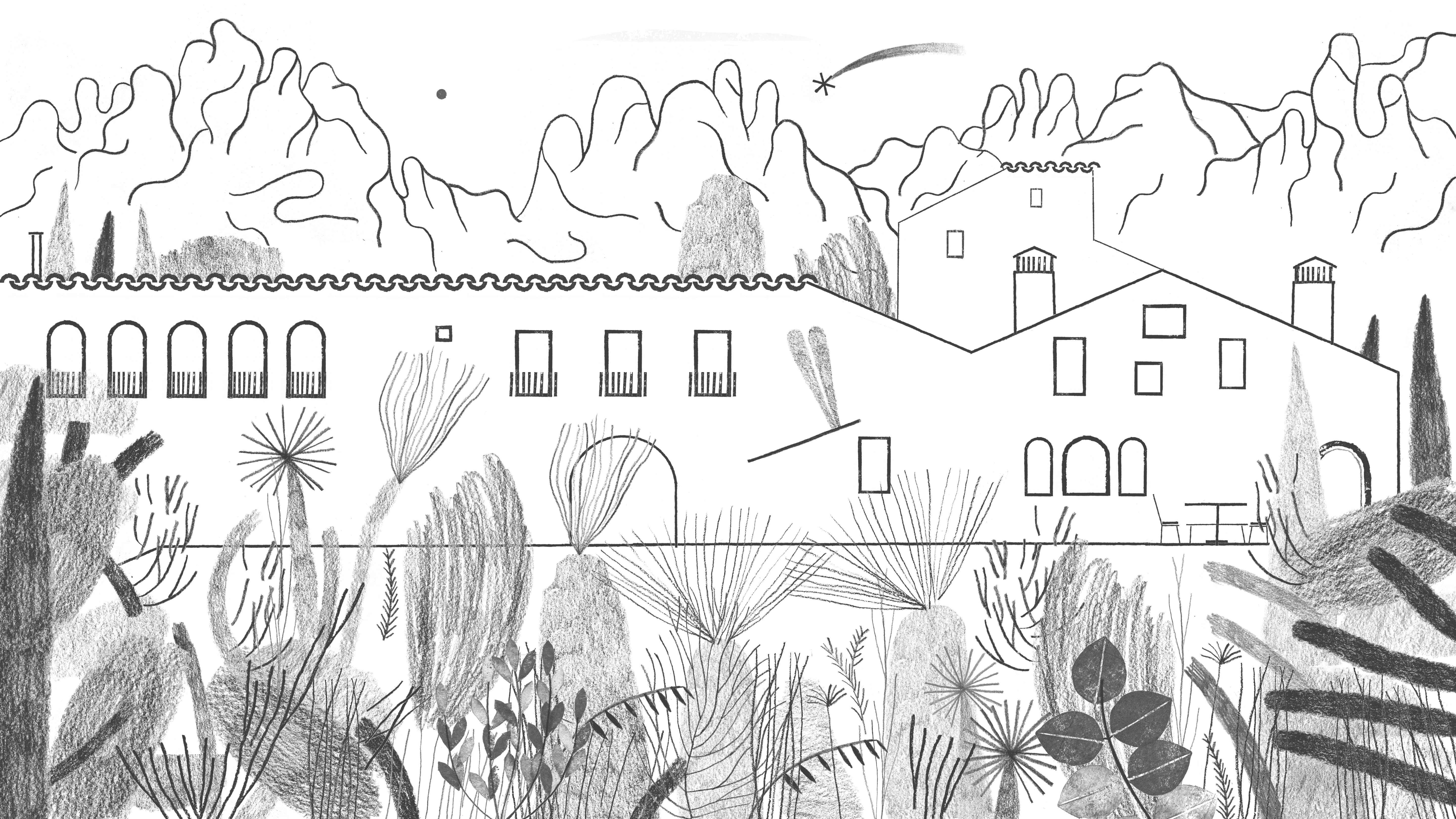FALL 2026
OPEN CALL
for VISUAL and MULTIDISCIPLINARY ART
at CAN SERRAT
Can Serrat is a farmhouse located in El Bruc (Montserrat), 45 km from Barcelona. Since 1989, it has hosted one of the oldest international residency programs for artistic and literary projects in Catalonia.
The program focuses on supporting and guiding the creative process through both individual and collective meetings, as well as fostering connections within an extensive professional cultural network. The house can accommodate up to 35 people from different countries and disciplines, allowing for a wealth of enriching exchanges.
Can Serrat receives support from the Government of Catalonia and is a member of Xarxaprod (the network of artistic production centers in Catalonia) and the TAV-CC.
Selection Criteria:
-
Uniqueness of the Proposal
-
Relevance of the Project: Connection between your project and the Can Serrat program, as well as the surrounding environment. Projects that engage meaningfully and originally with the cultural, social, and natural context of the region.
SCHOLARSHIPS and IMPORTANT DATES
Residency Dates: August – December 10th, 2026
Application Period: 4-30th September, 2025
Invitations:
-
-
Full Grant for six weeks + artist fee (Set – Oct)
-
Full Grant for one month (Nov)
-
20 Partial Grants
-
CONDITIONS
Benefits for all selected residents:
-
Full access to all shared spaces and resources
You will be free to use the common work areas, available equipment, and creative spaces at Can Serrat. -
Participation in all activities
You will be an active part of a dynamic community: activities, outings, meetings, and shared moments. -
Travel covered for organized activities
We take care of transportation for the visits and events organized by Can Serrat. -
Connection with the local environment
You’ll have the opportunity to connect with artists, collectives, spaces, and initiatives in the region. -
Visibility of your project and process
We will share your work through our social media and communication channels to highlight your participation. -
Publication in the digital project archive
Your process will become part of the collective archive of residents and will be available on the residency website. -
Follow-up meetings
Support sessions with a team member to talk about your process, needs, or concerns. - Studio Visits
We invite a local cultural professional to visit and talk with the visual or multidisciplinary artists about their work.
SPECIFIC CONDITIONS:
Full Grant + artist fee:
-
Accommodation at Can Serrat (private room for six weeks between September and October)
-
Meals: 2 prepared community dinners per week, access to a list of basic food supplies (coffee, tea, condiments, and some dry goods depending on availability)
- Artist Fee 2250€
Full Grant :
-
Accommodation at Can Serrat (shared room for one month during November)
-
Meals: 2 prepared community dinners per week, basic food supplies (coffee, tea, condiments, and some dry goods depending on availability)
Partial Scholarship Options:
-
Minimum residency duration: one month
-
- Option 1 Shared room: €998.70/month (shared with up to 3 people)
-
Option 2 Private room: €1578.90/month
-
Option 3 Studio only (no accommodation or meals included): €274.50/month *
*Options 1 and 2 include 2 prepared community dinners, access to a list of basic food items (coffee, tea, condiments, and some dry goods, depending on availability).
JURY:
- Tamarind Rossetti and Stephen Wright
Usership Coordinators (artistic directors) of the Künstlerhaus Stuttgart, where their artistic programme, One Usership: agriculture is the future of art, is based on an integrated, eco-systemic vision of human and other-than-human artistic and aesthetic agency. This approach draws directly on their experience on a 1:1 scale agroecological test site in the Corrèze called Ferme au Sauvage, growing organic fruits and vegetables, offering farm-to-table meals and farm-to-panel ‘ideaseeding’ workshops, all documented through art. As usership coordinators, they see their role as an opportunity to metabolize ideas gleaned over the years from usology and permaculture within an art institution, making way for usership in the broadest sense. - Gizem Karakas
Her practice focuses on the struggles, ironies, comedy, and poetry of everyday life, often through semi-fictional narratives of individuals navigating interpersonal and context-based relationships. Her photo, video, sound, performance, and text-based works explore the concept of sincerity in relationships through the ambiguous areas left between the intimate and the public, reality and fiction, art, and life. Her creative process embodies collaboration, hospitality, and camaraderie, transforming relationships from mere concepts within her work into an integral part of her methodology.
- Sophie Blais: Director at Can Serrat (non-voting voice)
- Sarah Goodchild Robb: Activities Coordinator at Can Serrat (non-voting voice)
HOW TO APPLY?
Tips for submitting your application:
-
Use simple and clear sentences to explain your proposal.
-
Avoid automated art speak and the use of “-isms.”
-
Although nature and rurality are important themes for the residency, bear in mind that Can Serrat receives many applications that explore these concepts. Therefore, we are especially interested in understanding what new or original perspective your proposal brings regarding these topics.
-
Research Can Serrat and its surroundings to better contextualize your project.
Application Procedure and Required Documents
-
Fill out the APPLICATION FORM with your details.
-
You will also be asked to provide a .PDF file titled: “lastname_firstname_MultiVA_F_2026Call”.
This document should include:
-
- A video* (3 min max) or a series of images* to showcase/talk about your work.
- Brief description of the project you plan to carry out during your stay at Can Serrat (500 words maximum).
- Artist statement (may share information about your process, contextualize your interests, and/or talk about your current area of research). (200 words maximum).
- CV (1 page max).
- Website link (if applicable).
*Please include an embedded link in the PDF so we can access the video or images.
The application may be in Catalan, Spanish, or English. We cannot accept other languages at this time.
We encourage you to review the 2025 Handbook to learn more about the residency_


 Español
Español Catalá
Catalá